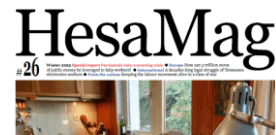One of the most useful occupational health and safety (OHS) publications is HesaMag, “the health and safety magazine with a European view”. (It is a hard copy, free and excellent. A must-have) Its latest edition has a feature on psychosocial risks (PSR) at work. I know that some of us are “over it”, but it is unavoidable and, as COVID did recently, may become the OHS matter that dominates our work. We must understand the risks to control them and prevent harm.
Anyway, back to HesaMag. One of its features is that much of its data relies on sources other than workers’ compensation and, so, is more accurate about trends. One example in the current issue, Pierre Bérastégui writes:






